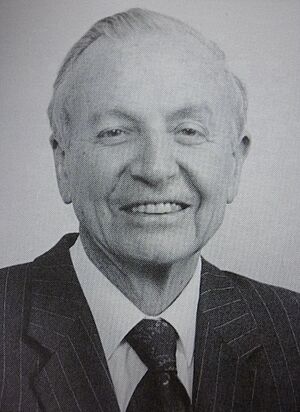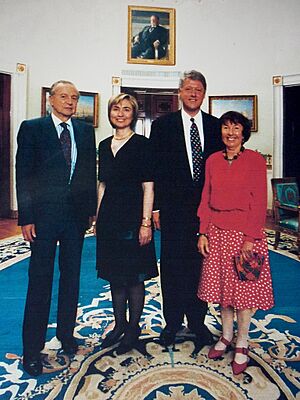Harry Schwarz facts for kids
Quick facts for kids
Harry Schwarz
|
|
|---|---|
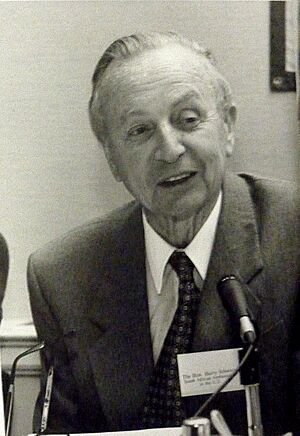 |
|
| South African Ambassador to the United States | |
| In office 6 March 1991 – 12 January 1995 |
|
| President | F. W. de Klerk Nelson Mandela |
| Preceded by | Piet Koornhof |
| Succeeded by | Franklin Sonn |
| Shadow Minister of Finance | |
| In office 30 November 1977 – 5 May 1987 |
|
| Preceded by | John Jaminan |
| Succeeded by | Jan van Zyl |
| Shadow Minister of Defence | |
| In office 1977–1984 |
|
| Preceded by | Vause Raw |
| Succeeded by | Roger Hulley |
| Leader of the Opposition in the Transvaal | |
| In office 1963–1974 |
|
| Succeeded by | Alf Widman |
| Member of the House of Assembly for Yeoville | |
| In office 24 April 1974 – 6 February 1991 |
|
| Succeeded by | Douglas Gibson |
| Member of the Transvaal Provincial Council for Hillbrow | |
| In office 1958–1974 |
|
| Personal details | |
| Born |
Harry Heinz Schwarz
13 May 1924 Cologne, Germany |
| Died | 5 February 2010 (aged 85) Johannesburg, South Africa |
| Political party | United Party Reform Party Progressive Reform Party Progressive Federal Party Democratic Party |
| Spouse | Annette Louise Schwarz (m. 1952) |
| Children | Jonathan Allan Michael |
| Alma mater | University of the Witwatersrand |
| Profession | Lawyer |
| Military service | |
| Allegiance | South Africa |
| Branch/service | South African Air Force |
| Years of service | 1943-1945 |
| Rank | navigator |
| Unit | 15 Squadron |
| Battles/wars | |
Harry Heinz Schwarz (born May 13, 1924 – died February 5, 2010) was a famous South African lawyer and politician. He was known for strongly opposing apartheid, a system of racial segregation in South Africa. Later, he became the South African Ambassador to the United States. This happened when South Africa was changing to a majority rule government, where everyone could vote.
Harry Schwarz grew up in poverty as a Jewish refugee from Germany. He became a lawyer and a leader in politics. For over 40 years, he was part of the opposition, meaning he worked against the ruling party's policies. He was one of the first white politicians to call for a peaceful end to apartheid. In 1974, he signed an important agreement called the Mahlabatini Declaration of Faith. This agreement aimed for a fair and equal society in South Africa.
His appointment as ambassador in 1990 showed the world that South Africa was serious about ending apartheid. He helped improve South Africa's image as a new, democratic country. Harry Schwarz was also a World War II veteran. He co-founded the Torch Commando, a group of ex-soldiers who protested against unfair laws. He was known for his strong debates in parliament against the apartheid government. He never lost an election in his 43-year political career.
Contents
- Early Life and Challenges
- University Days and Early Politics
- The Rivonia Trial
- Starting a Political Career
- Standing Up Against Apartheid
- Parliamentary Career
- Visiting Nelson Mandela in Prison
- South African Ambassador to the United States
- Jewish Community Leadership
- Later Life and Legacy
- Awards and Honours
- See also
Early Life and Challenges
Harry Schwarz was born Heinz Schwarz in Cologne, Germany. His family was Jewish. In 1934, he came to South Africa as a refugee with his mother and younger brother. His father had already left Germany when the Nazis came to power.
When they arrived in Cape Town, they lived in a small room. Harry remembered being very poor and sometimes hungry. He also faced teasing at school because he was different and didn't speak English or Afrikaans at first. These early experiences taught him a lot about unfairness and shaped his strong belief in social justice.
He went to school in Cape Town and then Jeppe High School for Boys in Johannesburg.
Fighting in World War II
After finishing school in 1943, Harry Schwarz decided to join the South African Air Force. He wanted to fight against Nazism in World War II. He became a navigator and fought in North Africa, Crete, and Italy. During his time in the air force, he changed his name from Heinz to Harry. His Colonel thought Harry would be a safer name if he was captured by Germans. He was part of the 15 Squadron.
University Days and Early Politics
In 1946, Harry Schwarz went to the University of the Witwatersrand (often called Wits University). He got help from a government loan. There, he met and became friends with Nelson Mandela and Joe Slovo, who would also become important anti-apartheid activists.
Harry joined the United Party and helped with the 1948 election. When the National Party won, he became even more determined to fight against them. He believed their victory could be reversed. He also became president of the university's ex-servicemen's league. He earned degrees in history, economic history, and law. In 1953, he became a lawyer in South Africa.
The Rivonia Trial
In 1963, Nelson Mandela and other political opponents were arrested. They faced a famous court case known as the Rivonia Trial. Harry Schwarz was one of the lawyers defending Jimmy Kantor, a close friend. Kantor was also arrested and charged with the same crimes as Mandela.
Harry Schwarz argued strongly for Kantor. The judge eventually said there was no case against Kantor, and he was set free. Harry Schwarz refused to be paid for his work on this case. After the trial, he decided to focus fully on fighting apartheid. He later visited Nelson Mandela in prison after 1988.
Starting a Political Career
Harry Schwarz's political journey began in 1951. He was elected to the Johannesburg City Council for the Booysens area. Many thought this seat was impossible to win against the National Party, but Schwarz won by a large number of votes. Even though he was the youngest person on the council, he became the chairman of an important committee. He worked to challenge unfair evictions of black and mixed-race people and tried to improve housing and education.
In 1958, he was elected to the Transvaal provincial council. He became the Leader of the Opposition in this council in 1963, a position he held until 1974. He continued to work as a lawyer throughout his political career.
In 1973, Schwarz wrote a document called the "Act of Dedication." It called for South Africa to become a society where everyone was treated equally, without discrimination. The United Party in Transvaal supported it, but the National Party refused to discuss it in parliament.
Standing Up Against Apartheid
Harry Schwarz was known for being a strong voice against apartheid. In the early 1970s, he led a group within the United Party called the "Young Turks." They wanted the party to fight apartheid more aggressively. This caused disagreements with the party's older leaders.
The Mahlabatini Declaration
On January 4, 1974, Harry Schwarz met with Mangosuthu Buthelezi, a leader of the black homeland of KwaZulu. They agreed on a five-point plan for peace in South Africa. This plan became known as the Mahlabatini Declaration of Faith.
The declaration called for talks involving all people to create a new constitution. It stressed equal opportunities for everyone and a Bill of rights to protect these rights. It also said that political change should happen peacefully. This was a big step because at that time, neither the National Party nor the African National Congress were looking for peaceful talks. Many people, especially in the English-speaking press, saw this as a major breakthrough.
However, this declaration made some in the United Party angry. It led to Schwarz and other liberal members being expelled from the party the next year.
Parliamentary Career
Harry Schwarz played a key role in changing the political opposition in South Africa. In the 1974 South African general election, he was elected to Parliament for Yeoville.
In February 1975, Harry Schwarz was expelled from the United Party. This happened after he said, "I am my brother's keeper," supporting another member who had been kicked out for liberal views. After his expulsion, four other Members of Parliament (MPs) and many local council members also resigned. That night, the Reform Party was started, with Schwarz as its leader. This new party believed in the principles of the Mahlabatini Declaration, calling for equal voting rights for all.
Later, the Reform Party joined with the Progressive Party to form the Progressive Reform Party. Schwarz became a key leader, speaking on finance and defense. In 1977, the party was renamed the Progressive Federal Party. This party became the main opposition party in South Africa.
A Strong Voice in Parliament
As a co-founder and leader, Schwarz was known for his sharp attacks on the National Party. He was so effective as the Shadow Finance Minister that the actual Finance Ministers were said to be afraid of him. He helped expose a big government scandal in 1979, which led to the Prime Minister's resignation.
Schwarz often had strong arguments in parliament with government officials. He always refused offers to join the National Party's government because he was against apartheid.
Protecting Press Freedom
In 1979, Schwarz asked the National Party to rethink a law that would limit press freedom. He believed a free press was very important for South Africa's defense and for society. He said that restricting the press would be a "turning point" in South African politics.
Pushing for a Bill of Rights
In August 1983, during a debate about a new constitution, Harry Schwarz proposed something new. He called for a 'Bill of Rights' to be added to South Africa's constitution. This was the first time such a motion was brought to Parliament.
He said this Bill of Rights should protect everyone from discrimination based on race, color, gender, or religion. It should also guarantee freedom of speech, thought, and movement. He believed it would protect rights that many people had fought for and unite the country. While his party supported it, no other party in Parliament did. The National Party blocked his proposal. However, the new constitution of South Africa, signed in 1996, eventually included a Bill of Rights with similar principles.
Schwarz was sometimes called "Harry the Hawk" because he supported a strong military and believed political change should happen without chaos. He sometimes disagreed with other members of his party, like Helen Suzman, but they respected each other.
Joining the Democratic Party
Schwarz was one of the people who helped start the Democratic Party. He believed in a federal system for South Africa, like the United States, and a Bill of Rights to protect everyone's rights. He often said, "Freedom is incomplete if it is exercised in poverty."
On February 6, 1991, he left Parliament. He was appointed as the South African ambassador to the United States. His farewell speech was titled "Look after my people while I'm gone."
Visiting Nelson Mandela in Prison
After the 1964 Rivonia Trial, Harry Schwarz was not allowed to visit his university friend, Nelson Mandela, in prison. But after Mandela was moved to Victor Verster Prison, some rules changed. On November 23, 1989, Schwarz visited Mandela at his request. After the visit, Schwarz called for Mandela's "immediate and unconditional" release. He said it was important for all South Africans.
South African Ambassador to the United States
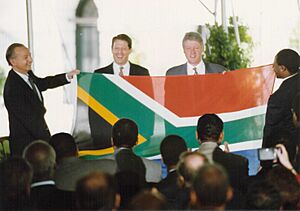
Harry Schwarz made history as the first politician from the opposition to become a senior ambassador. He was also the first Jewish ambassador for South Africa. He agreed to become ambassador because the government was finally committed to the big changes he had fought for.
He told the New York Times that he was not asked to change his beliefs. He said, "I've made it clear that I want to be ambassador for 37 million people," meaning all South Africans, not just white people. His appointment showed the world that South Africa was serious about ending apartheid.
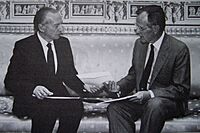
Making Peace Between Nations
Schwarz is praised for helping to improve relations between South Africa and the United States. During his time as ambassador, he helped lift US sanctions against South Africa. He also secured a large aid package from President Bill Clinton and hosted President Mandela's visit to the US in 1994.
After the African National Congress won the 1994 election, President Nelson Mandela asked Schwarz to stay on as ambassador for a few more months. Schwarz agreed and returned to South Africa in November 1994.
Jewish Community Leadership
From the mid-1970s, Harry Schwarz became a leading figure in the South African Jewish community. He often spoke out against anti-Jewish comments and actions by public figures. He believed that Judaism was against segregation. He also stressed that Jews needed a democratic society where they could practice their religion freely and love Israel. He worked to ensure that Jews in South Africa felt safe and connected, especially after the end of apartheid.
Later Life and Legacy
After returning from Washington, Harry Schwarz retired from politics. He continued to work as a lawyer in Johannesburg until he passed away. He was critical of some later political decisions but remained active in the Jewish community. He served as president of the South Africa-Israel Chamber of Commerce and vice-president of the South African Jewish Board of Deputies.
Harry Schwarz gave his last public speech in November 2009, repeating his belief that "freedom is incomplete if it is exercised in poverty." He and his wife, Annette, also set up a charity called the Schwarz Upliftment Trust.
Death and Tributes
Harry Schwarz passed away on February 5, 2010, at the age of 85. He was buried in Johannesburg. Many people, including political leaders, paid tribute to him.
Democratic Alliance leader Helen Zille praised his intelligence and his strong opposition to racial nationalism. South African President Jacob Zuma also honored Schwarz in a speech. The Jewish Board of Deputies described him as a "brave, unyielding fighter for justice." Many remembered him as a key figure who helped bring democracy and human rights to South Africa.
Awards and Honours
- Society of Advocates prize (1948)
- Transvaal Law Society Prize (1949)
- 'Newsmaker of the Year', Southern African Society of Journalists (1974)
- Honorary Colonel of 15 Squadron, South African Air Force (1984)
- Order for Meritorious Service (Gold) (1988)
- Human Rights Award "for opposing Apartheid and fighting for social justice", St Francis Academy (1991)
- International Honorary Citizen of the City of New Orleans, Mayor of New Orleans (1992)
- Humanitarian Award "for his commitment to human rights and for his enduring dedication to the state of Israel", State of Israel Bonds (1993)
- 'Moral Statesman of the Year', Anti-Defamation League (1994)
- Honorary Doctorate from the University of Judaism (now the American Jewish University) (1995)
- Honorary Life Vice-President of the Gauteng Council, Jewish Board of Deputies (2002)
- Honorary Doctorate from the University of Stellenbosch (2005)
- Honorary fellow of the Hebrew University of Jerusalem (2005)
The hall at Sir John Adamson Secondary School is named after Harry Schwarz. He was the first chairperson of the school's governing body.
See also
In Spanish: Harry Schwarz para niños
 | Emma Amos |
 | Edward Mitchell Bannister |
 | Larry D. Alexander |
 | Ernie Barnes |


